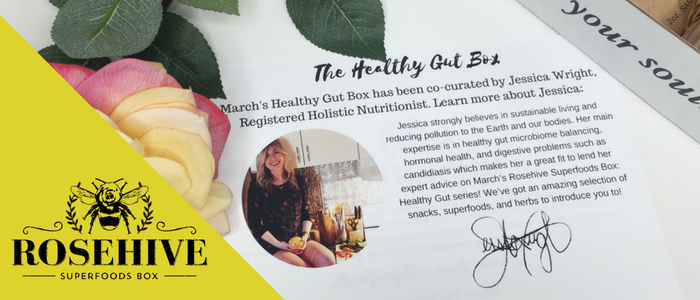
Jessica Wright is a Registered Holistic Nutritionist from Ontario, Canada specializing in healthy gut microbiome balancing, hormonal health, and digestive problems. Jessica co-curated March’s Rosehive Superfoods Box.
Here is what Jessica has to say about living a life with a focus on healthy digestion.
Leaky gut syndrome is a rapidly growing condition that many of us are living with whether we realize it or not. It has been linked to food allergies and sensitivities, low energy and fatigue, slow metabolism and mental illnesses just to name a few.
What exactly is leaky gut syndrome? It occurs when the lining of your gut becomes damaged and fails to act as a barrier. Your digestive tract has very small holes in it designed to allow specific substances through and when it becomes damaged or inflamed, bigger holes develop in the lining making it easy for harmful substances like gluten, toxic waste and undigested food to pass through into your bloodstream. Once these toxins enter into your bloodstream it creates inflammation and triggers an immune response leaving your body in a ‘fight or flight’ state that quickly becomes exhausted and overworked.
People who are suffering from a leaky gut will often complain of bloating, fatigue, food allergies, skin sensitivities, headaches, digestive imbalances, anxiety and weight gain. If the digestive tract lining is not repaired it can lead to more severe health issues such as IBS, autoimmune diseases, depression, migraines, chronic fatigue, eczema or psoriasis. Not to mention, nutrients like vitamin B12, iron and zinc are not absorbed properly and when people become deficient they will struggle with even more health issues.
What causes leaky gut? Poor diet and stress can weaken the immune system and lead to a leaky gut however, the main cause of leaky gut syndrome is dysbiosis (bacterial imbalance in the digestive tract). A healthy gut will have a balance of good and bad bacteria that help break down food. Have you ever wondered why so many people suffer from gluten and dairy allergies? This is because the proteins found in unsprouted grains and conventional dairy are the most damaging to the intestinal lining. They leak through the gut barrier into the bloodstream and wreak havoc on the immune system. Sugar is another culprit when it comes to bacterial imbalance in the gut. Yeast and bad bacteria thrive when sugar is consumed because it feeds them and rapidly increases their numbers. Yeast releases endotoxins that circulate throughout the body and are associated with candidiasis, estrogen dominance and a number of psychological disorders because they breech the blood-brain barrier. Other toxins that inhibit good bacteria are antibiotics, tap water, pesticides and NSAIDS (nonsteroidal anti-inflammatory drugs) including aspirin.
Now that we know what leaky gut syndrome is and what causes it, we must direct our focus on how to heal it.
It takes time and self awareness. Keeping a food diary can help shed light on how you feel after eating specific foods. First, remove foods and toxins that damage your gut and replace them with healing foods. With today’s industrialized food movement, we can’t always acquire nutrient dense foods so we must supplement to help repair our digestive tract. Finally, balance the gut flora with probiotics.
You can add anti-inflammatory ingredients and supplements into your diet (though this is definitely not a cure-all). Every time I make a meal plan for a client living with a leaky gut, I recommend five foods:
Bone broth soup- everyone can benefit from eating bone broth soup because it is packed with collagen and amino acids essential for soothing and repairing damaged cells. If you’re vegan you can take collagen and amino acid supplements instead.
Raw cultured dairy- loaded with probiotics and short-chain fatty acids to balance dysbiosis. Kefir, yogurt and raw cheese are great. Again, if you’re vegan you can take a probiotic supplement with at least 50 billion CFU’s or try coconut kefir or coconut yogurt.
Sprouted seeds- they are easy to digest and rich with enzymes to repopulate beneficial bacteria. The highest in fiber are sprouted hemp seeds, chia seeds and flaxseeds.
Coconut- coconut products help reduce candidiasis and are easily digestible unlike other fats.
Fermented foods- these help balance intestinal pH to support your gut and are loaded with probiotics. Sauerkraut, kvass and kimchi are the most popular fermented vegetables. These foods promote the growth of the good bacteria you need to better digest food and keep things running smoothly as far as digestion is concerned.
Functional foods like turmeric, reishi mushrooms and lucuma (a Peruvian fruit that contains beta carotene, iron, zinc, vitamin B3, calcium, and protein) can also help to naturally calm internal inflammation.
Vital supplements I recommend to support the previously mentioned foods are:
Probiotics- at least 50 billion CFU’s
L-glutamine- this is especially important to vegans who are not getting enough collagen and amino acids through their diet. It soothes and repairs the gut lining. Take 2-5 grams of L-glutamine powder daily.
Digestive enzymes- these help break down the food to ensure undigested food particles do not leak into the bloodstream. Try taking 1 or 2 capsules at the beginning of a protein rich meal.
Quercetin- this is a seriously underrated supplement for treating leaky gut syndrome. It helps seal the gut and minimize histamine levels. Take 500mg 2-3 times daily with meals.
A healthy gut full of friendly microbes can boost your body’s immune system, which as we learned earlier, is one of the key culprits of inflammation. Remember to be patient, be aware of your environment and pay attention to what you’re eating. I hope you are enjoying March’s Healthy Gut Box!
Discover New Superfoods Every Month. Try Rosehive Superfoods Box.



